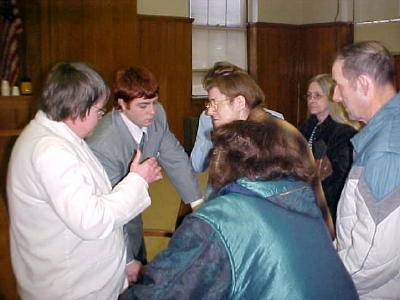
Defense Attorney Teresa Monk talks with Ronnie Rush (wearing
suit)
and Rush family members, shortly after verdict was read
By Bob Weaver
The Ronnie Rush murder case is being appealed to the West Virginia Supreme Court of Appeals by his public defenders, seeking a new trial.
The Calhoun youth was sentenced to 40 years in the state penitentiary for robbery, and two indeterminate sentences of 15-40 years for two offenses in the voluntary manslaughter of Warden Groves, 69, and Mary Hicks, 60
Rush, who was 16-years-old at the time of the brutal double murders in 2003, was tried as an adult.
Public Defender Teresa Monk will appear before the high court Tuesday at 10 a.m. The hearing can be viewed live on the WV Supreme Court's web site ... see Supreme Court of Appeals of West Virginia
The appeal outlines a number of errors by the West Virginia State Police and alleges the trial court violated Rush's legal and constitutional rights.
During Rush's trial, officers gave contradictory testimony several different times.
The murder case got off to a rocky start when State Police first arrested Stumptown resident Bobby Shamblin, based on information provided by Rush.
The charges against Shamblin could not be sustained and he was released from jail.
The appeal says that juvenile Rush should have immediately been taken before a referee, judge or magistrate, but was instead held in custody by the State Police for about 10-12 hours.
The appeal says "The defendant's rights were violated because neither his parents or attorney were present during any of the statements ... the defendant did not knowingly and voluntarily waive his rights."
"There was no evidence that State Police requested the presence of Rush's parents at the police barracks while their son was being questioned," being fed once during the extended custody.
The appeal says that "During a pre-interview session ... the defendant requested counsel" indicating Rush's rights were violated.
Sgt. Dale Fluharty disrupted a lie detector test, rushing through a closed door, testifying "I was angry, loud and used profanity."
Testimony indicated Fluharty was angry because Rush "lawyered-up."
The court record indicates Fluharty didn't inform detachment commander Sgt. Jeff Cooper of the youth's request for an attorney.
Fluharty said "I didn't think it was relevant."
Fluharty was reprimanded for his unprofessional misconduct, and was suspended from work for one day.
Attorney Monk says there are significant problems related to Rush's mental capacity, which the appeal indicates were ignored.
Key points mentioned in the appeal:
- The Circuit Court erred in denying a motion to suppress his out of court statements because the State violated the Prompt Presentment Rule.
- The Circuit Court erred by transferring Rush from juvenile to adult status, essentially failing to consider his mental and emotional status, his education, family background, and other personal factors.
- The Circuit Court erred by abusing its discretion by allowing the State to use out of court statements that were coerced from Rush.
- Issues related to insufficient evidence related to the aggravated robbery charges.
- The Trial Court erred by abusing its discretion by refusing to transfer the case back to juvenile court when the charges elevating the case to adult status were dismissed at the trial.
From the Hur Herald Archives
State Police arrest Shamblin for double murder
Police say youth could be charged for murder
Shamblin released on $100,000 bond
Calhoun juvenile still being held
Judge issues gag order in Rush case
Batches of cash could link Rush to double murder
Rush indicted on murder charges
$200,000 bond set for Rush
Minney asks jurors to "Follow The Money"
Rush gave conflicting accounts
Defense raises questions Regarding Rush's rights
Rush found guilty of voluntary manslaughter
| 


